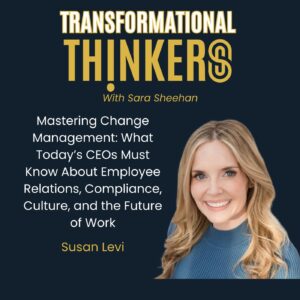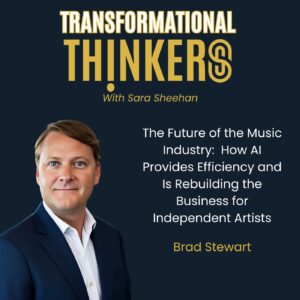Sara Sheehan’s guest in this episode is Barry LaBov, a two-time Ernst & Young Entrepreneur of the Year award winner and the founder of LABOV Marketing Communications and Training. Barry LaBov shares his career journey with Sara, explaining how he learned through the jobs he held before coming to the position he’s in today. Barry’s book, The Power of Differentiation, speaks to the main focus of his company and Sara learns how Barry views every company as having a distinctiveness that sets them apart.
Barry began his career journey in music. As a rock musician who ran a jingle company, he wasn’t particularly looking for a career in marketing. He describes his business as “an accident” that was born out of necessity. He sold the jingle company and moved on to the marketing and training career he has today. He shares with Sara that the focus of his company is helping his clients find the one or two unique things they offer that none of their competitors can touch, and that’s what makes his clients, and by extension, his company successful.
Sara and Barry explore the concept of differentiation and discuss how working with the right clients is an important part of success. Barry says “Saying no should happen far more than saying yes to any client that walks up to you”. He talks about delivering a difference, how he realized that his book needed to be about improving brand differentiation, and why his book is largely about how 50 different companies transitioned from look-alike commodities to originality of appeal that launched success. This episode encourages finding the unique differences that set our businesses apart in the hearts and minds of customers.
About Barry LaBov:
Barry LaBov is the founder and CEO of LABOV Marketing Communications and Training. He is a two-time Ernst & Young Entrepreneur of the Year recipient and an inductee into the Entrepreneur of the Year Hall of Fame. He is also a Better Business Bureau Torch Awards for Ethics recipient. Under his leadership, LABOV Marketing Communications and Training has received the Indiana Growth 100 Award six times, was named Small Business of the Year and recognized as one of the Best Places to Work in Indiana. Additionally, LABOV’s client work has been honored with nearly 100 national and regional awards.
Barry has authored or co-authored over a dozen business books, including his forthcoming book, The Power of Differentiation, which will be published by Indigo River and distributed through Simon & Schuster. In the book, he shares experiences and actionable recommendations for leaders seeking to differentiate their brands and products. He has also written over 100 business articles on a range of topics, including brand re-engineering, customer loyalty, employee engagement, training strategy, dealer/distributor network performance and much more. Barry has been interviewed as a subject matter expert on CNBC, Fox Business and in several videos and podcasts.
__
Resources discussed in this episode:
—
Contact Sara Sheehan | Sara Sheehan Consulting:
Barry LaBov | LABOV Marketing Communications and Training
- Website: BarryLaBov.com
- Website: LABOV.com
Hosted by Simplecast, an AdsWizz company. See pcm.adswizz.com for information about our collection and use of personal data for advertising.


